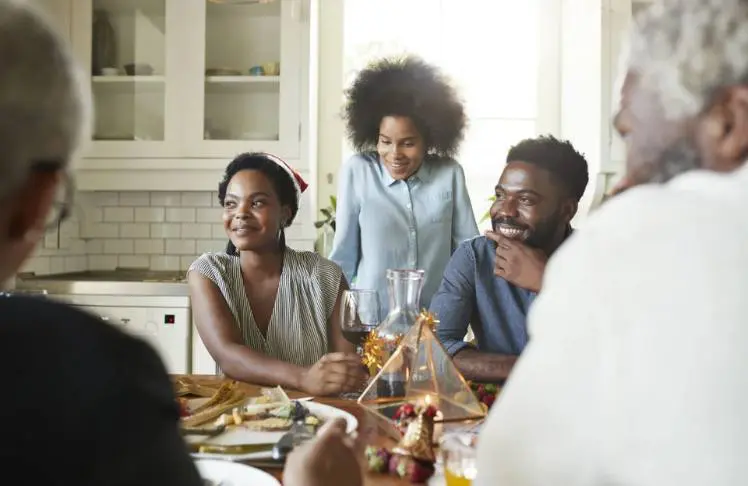
The holidays are a time to feast, celebrate, and make good memories with family, but what do you do when your relatives cause you stress?
The thought of attending a family event is enough to induce anxiety for some. It could mean having to deal with loved ones who stir up drama, ask intrusive questions, or make inappropriate comments.
For Black folks — whose family dynamics are shaped by systemic racism — the challenge could be maintaining joy while processing the death of a cousin by gun violence or coping around an uncle who struggles with an undiagnosed mental illness.
These factors may leave a person wondering: should I or should I not go?
Brandon Jones, a psychotherapist who specializes in intergenerational trauma, says whether or not a person is with relatives or alone, there’s a way to enjoy the holiday season. I sat down with him to talk about how people can mentally prepare for family settings or make the most of their time away.
WORD IN BLACK: As a therapist, what are some toxic family dynamics that you expect Black families to experience during the holidays?
BRANDON JONES: I would say there’s three things that end up happening. The first thing is dealing with grudges. There’s a lot of stuff that happens over the year, and a lot of times I’ve noticed, just with my clients, that African American folks, we’ll hold grudges toward folks, because we don’t always address the issue at hand, or we’ll work around the issue, or we’ll sweep it under the rug.

Now, I don’t think that’s anything unique to African American folks, but this is something that I’ve just noticed is a pattern, is when it comes to family, we will keep things cordial and we won’t deal with the issues right away. So, when the holiday season comes up and you’re expected to be around people, a lot of times those grudges and those issues pop them back up and then we’re dealing with them in a time when we’re all supposed to be jolly and happy and supportive, but there’s a lot of stress that comes out.
So, that’s one thing: grudges. Which leads to the second thing, which is just dealing with forgiveness. Since there are a lot of different dynamics that can happen, I think that it’s hard for us to forgive, and do that in a healthy way. And that doesn’t mean forget what happened, and let things go. It just means getting to a place of acceptance for what has taken place within the dynamic. And then also figuring out how to navigate knowing that that harm has been done or that pain has been done.
The third thing, which I think is the most important. It’s just something that, again, everyone deals with, but in the Black community, I think we have such a unique experience with, is grief. We deal with a lot of grief. We end up losing people, whether that’s through death, people who’ve moved or relocated, or people who may be incarcerated, or they may go off to the military.
WIB: It can be a challenge deciding whether or not to attend a family gathering when there are unhealthy dynamics at play. For people who are on the fence, what would you suggest they consider before deciding?
BJ: I think the individual needs to figure out what their tolerance level is going to be going into the space. If someone brings up the incident, or if someone calls you by the wrong name, or the wrong pronoun, or whatever, can you tolerate it enough to be in that place?
And if the answer is, “I’ll try my best, but if somebody brings this up, I need to leave,” give yourself permission to leave. You don’t have to be there the entire time. You don’t have to put up with other people’s stuff. And then, you know, in the Black community, we like to tease each other and have a little fun. That’s how we have fun, by dissing one another sometimes. And sometimes you don’t want to be the butt end of the joke. You don’t want people to point out your changes or what you’re going through in your journey. So, that may be another sign, is how much am I willing to tolerate when it comes to how my family engages.
And a lot of times when we talk about boundaries, we think about saying “no,” and it’s a part of it, but really boundaries are an expectation of how you expect other people to treat you and how you expect to treat yourself. So, spending some time before the event, before the gatherings, before, you know, the parties and things, to think about what are my boundaries going to be in this space.
Some boundaries may look different with different people. If Uncle so and so is there, that’s the person who’s always talking about this. My boundary with this person is to not spend too much time in that space with that person.
WIB: Practically, how should people set boundaries before entering those spaces? Should they make a list of what they will and won’t tolerate? Or should they practice saying them aloud?
BJ: If it’s a post-it note or a journal or a piece of paper, I would write it down and I would put it somewhere where you can see it consistently as an affirmation or a reminder.
Some people like to repeat things to themselves or say them out loud. That may be good. Maybe, you can use your phone and use one of your voice memo apps to record yourself and listen to that on the way there. There’s a lot of things, but just those consistent reminders, I think will help.
You just identify, OK, this is a boundary. “I’m not going to let this person get to me. I’m in control of my own body, space, and mind.” There are things that you can do to not necessarily hype yourself up or psych yourself out, but to really just convince yourself that you do have control.
WIB: For a person who’s decided to spend the holidays away from family, how can make the most of the day, to avoid depression, anxiety, or other mental illnesses?
BJ: I think they need to find some things that give them joy. Whether that’s watching movies and playing video games or listening to music or maybe it’s shopping or whatever. Plan an agenda. Line your day up with some activities.
For some of those folks, they might just want to stay in bed and get some rest. That’s OK, too. But definitely have an agenda for yourself for the day.















